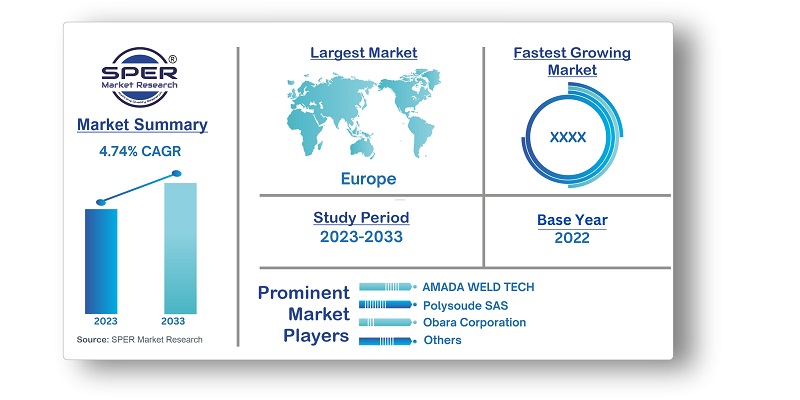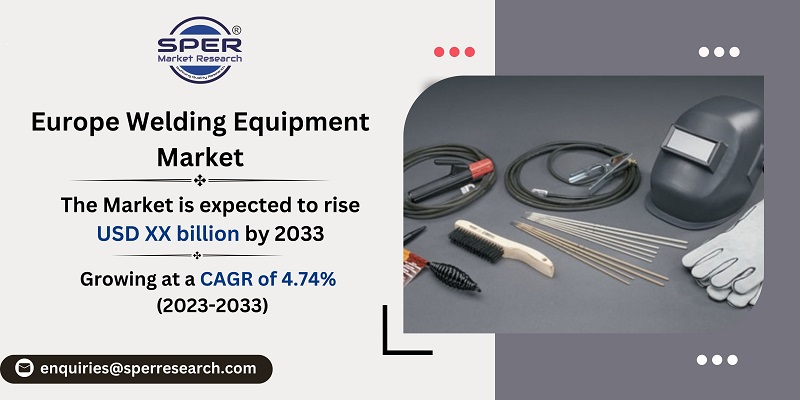
Europe Welding Equipment Market Growth, Size, Trends, Demand, Revenue and Future Outlook
Europe Welding Equipment Market Size- By Type, By Process, By End User- Regional Outlook, Competitive Strategies and Segment Forecast to 2033
| Published: Sep-2023 | Report ID: MACH2347 | Pages: 1 - 152 | Formats*: |
| Category : Equipment and Machinery | |||
- Lincoln Electric Holdings, Inc. announced in October 2022 that it has signed an agreement to purchase Fori Automation, Inc. The purchase will accelerate the automation growth strategy by providing new complementary capabilities, improved scale, and worldwide reach.
- Kemppi introduces the X5 FastMig Pulse welding device, designed specifically for industrial application, in October 2022. The modular welding solution is designed to be used in a range of situations, allowing manufacturers to create the assembly that best suits their needs.


| Report Metric | Details |
| Market size available for years | 2019-2033 |
| Base year considered | 2022 |
| Forecast period | 2023-2033 |
| Segments covered | By Type, By Process, By End User |
| Regions covered | France, Germany, Italy, Netherlands, Spain, United Kingdom, Rest of Europe |
| Companies Covered | AMADA WELD TECH, Carl Cloos Schweisstechnik GmbH, CEBORA S.p.A, Denyo Co. Ltd, Elektriska Svetsnings-Aktiebolaget (ESAB), EWM AG, Fronius International GmbH, Hobart Welders, Lincoln Electric Holdings Inc., Obara Corporation, Polysoude SAS. |
- Manufacturers and Suppliers
- Construction Industry
- Metal Fabrication and Manufacturing
- Oil and Gas Sector
- Government Agencies and Regulators
- Research and Development Organizations
| By Type: |
|
| By Process: |
|
| By End User: |
|
- Europe Welding Equipment Market Size (FY’2023-FY’2033)
- Overview of Europe Welding Equipment Market
- Segmentation of Europe Welding Equipment Market By Type (Welding Equipment and Welding Consumables)
- Segmentation of Europe Welding Equipment Market By Process (Arc Welding, Gas Welding, Soldering and Brazing, and Other Processes)
- Segmentation of Europe Welding Equipment Market By End User (Construction and Infrastructure, Oil and Gas, Energy and Power, Automotive and Shipbuilding, Aerospace and Defense, Heavy Engineering, Railways, and Other End Users)
- Statistical Snap of Europe Welding Equipment Market
- Expansion Analysis of Europe Welding Equipment Market
- Problems and Obstacles in Europe Welding Equipment Market
- Competitive Landscape in the Europe Welding Equipment Market
- Impact of COVID-19 and Demonetization on Europe Welding Equipment Market
- Details on Current Investment in Europe Welding Equipment Market
- Competitive Analysis of Europe Welding Equipment Market
- Prominent Players in the Europe Welding Equipment Market
- SWOT Analysis of Europe Welding Equipment Market
- Europe Welding Equipment Market Future Outlook and Projections (FY’2023-FY’2033)
- Recommendations from Analyst
1.1. Scope of the report1.2. Market segment analysis
2.1. Research data source2.1.1. Secondary Data2.1.2. Primary Data2.1.3. SPER’s internal database2.1.4. Premium insight from KOL’s2.2. Market size estimation2.2.1. Top-down and Bottom-up approach2.3. Data triangulation
4.1. Driver, Restraint, Opportunity and Challenges analysis4.1.1. Drivers4.1.2. Restraints4.1.3. Opportunities4.1.4. Challenges4.2. COVID-19 Impacts of the Europe Welding Equipment Market
5.1. SWOT Analysis5.1.1. Strengths5.1.2. Weaknesses5.1.3. Opportunities5.1.4. Threats5.2. PESTEL Analysis5.2.1. Political Landscape5.2.2. Economic Landscape5.2.3. Social Landscape5.2.4. Technological Landscape5.2.5. Environmental Landscape5.2.6. Legal Landscape5.3. PORTER’s Five Forces5.3.1. Bargaining power of suppliers5.3.2. Bargaining power of buyers5.3.3. Threat of Substitute5.3.4. Threat of new entrant5.3.5. Competitive rivalry5.4. Heat Map Analysis
6.1. Europe Welding Equipment Market Manufacturing Base Distribution, Sales Area, Product Type6.2. Mergers & Acquisitions, Partnerships, Product Launch, and Collaboration in Europe Welding Equipment Market
7.1. Europe Welding Equipment Market Value Share and Forecast, By Type, 2023-20337.2. Welding Equipment7.3. Welding Consumables
8.1. Europe Welding Equipment Market Value Share and Forecast, By Process, 2023-20338.2. Arc Welding8.3. Gas Welding8.4. Soldering and Brazing8.5. Resistance Welding8.6. Forge Welding8.7. Others
9.1. Europe Welding Equipment Market Value Share and Forecast, By End User, 2023-20339.2. Construction and Infrastructure9.3. Oil and Gas9.4. Energy and Power9.5. Automotive and Shipbuilding9.6. Aerospace and Defence9.7. Heavy Engineering9.8. Railways9.9. Others
10.1. Europe Welding Equipment Market Size and Market Share
11.1. Europe Welding Equipment Market Size and Market Share By Type (2019-2026)11.2. Europe Welding Equipment Market Size and Market Share By Type (2027-2033)
12.1. Europe Welding Equipment Market Size and Market Share By Process (2019-2026)12.2. Europe Welding Equipment Market Size and Market Share By Process (2027-2033)
13.1. Europe Welding Equipment Market Size and Market Share By End User (2019-2026)13.2. Europe Welding Equipment Market Size and Market Share By End User (2027-2033)
14.1. Europe Welding Equipment Market Size and Market Share By Region (2019-2026)14.2. Europe Welding Equipment Market Size and Market Share By Region (2027-2033)14.3. France14.4. Germany14.5. Italy14.6. Netherlands14.7. Spain14.8. United Kingdom14.9. Rest of Europe
15.1. AMADA WELD TECH15.1.1. Company details15.1.2. Financial outlook15.1.3. Product summary15.1.4. Recent developments15.2. Carl Cloos Schweisstechnik GmbH15.2.1. Company details15.2.2. Financial outlook15.2.3. Product summary15.2.4. Recent developments15.3. CEBORA S.p.A15.3.1. Company details15.3.2. Financial outlook15.3.3. Product summary15.3.4. Recent developments15.4. Denyo Co. Ltd15.4.1. Company details15.4.2. Financial outlook15.4.3. Product summary15.4.4. Recent developments15.5. Elektriska Svetsnings-Aktiebolaget (ESAB)15.5.1. Company details15.5.2. Financial outlook15.5.3. Product summary15.5.4. Recent developments15.6. EWM AG15.6.1. Company details15.6.2. Financial outlook15.6.3. Product summary15.6.4. Recent developments15.7. Fronius International GmbH15.7.1. Company details15.7.2. Financial outlook15.7.3. Product summary15.7.4. Recent developments15.8. Hobart Welders15.8.1. Company details15.8.2. Financial outlook15.8.3. Product summary15.8.4. Recent developments15.9. Lincoln Electric Holdings Inc.15.9.1. Company details15.9.2. Financial outlook15.9.3. Product summary15.9.4. Recent developments15.10. Obara Corporation15.10.1. Company details15.10.2. Financial outlook15.10.3. Product summary15.10.4. Recent developments15.11. Polysoude SAS15.11.1. Company details15.11.2. Financial outlook15.11.3. Product summary15.11.4. Recent developments15.12. Others
SPER Market Research’s methodology uses great emphasis on primary research to ensure that the market intelligence insights are up to date, reliable and accurate. Primary interviews are done with players involved in each phase of a supply chain to analyze the market forecasting. The secondary research method is used to help you fully understand how the future markets and the spending patterns look likes.
The report is based on in-depth qualitative and quantitative analysis of the Product Market. The quantitative analysis involves the application of various projection and sampling techniques. The qualitative analysis involves primary interviews, surveys, and vendor briefings. The data gathered as a result of these processes are validated through experts opinion. Our research methodology entails an ideal mixture of primary and secondary initiatives.



Frequently Asked Questions About This Report
PLACE AN ORDER
Year End Discount
Sample Report
Pre-Purchase Inquiry
NEED CUSTOMIZATION?
Request CustomizationCALL OR EMAIL US
100% Secure Payment






Related Reports
Our Global Clients
Our data-driven insights have influenced the strategy of 200+ reputed companies across the globe.




















